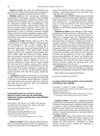 61 citations,
June 2014 in “Scientific Reports”
61 citations,
June 2014 in “Scientific Reports” Wnt1a-conditioned medium from stem cells helps activate cells important for hair growth and can promote hair regrowth.
 50 citations,
December 2010 in “Dermatologic Surgery”
50 citations,
December 2010 in “Dermatologic Surgery” Laser treatment can stimulate hair growth for male pattern hair loss.
[object Object]  14 citations,
September 2018 in “International Journal of Molecular Sciences”
14 citations,
September 2018 in “International Journal of Molecular Sciences” Mackerel-derived fermented fish oil helps hair grow by activating growth pathways and increasing cell proliferation.
 4 citations,
February 2022 in “Frontiers in molecular biosciences”
4 citations,
February 2022 in “Frontiers in molecular biosciences” Chronic stress in mice changes skin metabolism and gene expression, leading to hair loss.
 19 citations,
November 2011 in “Journal of Dermatological Science”
19 citations,
November 2011 in “Journal of Dermatological Science” TGF-β1 increases androgen receptor activity in hair loss, but Hic-5/ARA55 can counter this effect.
28 citations,
September 2021 in “EMBO reports” Osthole inhibits the TRPV3 channel by binding to specific sites, potentially aiding drug development for skin diseases and cancers.
 58 citations,
January 2006 in “Skin Pharmacology and Physiology”
58 citations,
January 2006 in “Skin Pharmacology and Physiology” High levels of testosterone and 5α-DHT can lead to cell death in cells important for hair growth.
 20 citations,
October 2018 in “Aesthetic Plastic Surgery”
20 citations,
October 2018 in “Aesthetic Plastic Surgery” PRP shows promise for improving facial wrinkles, skin elasticity, and hair growth, but more research is needed to standardize its use and understand its effects.
 5 citations,
June 2017 in “in Vivo”
5 citations,
June 2017 in “in Vivo” Vitamin C deficiency changes gene expression, affecting skin and hair health.
2 citations,
May 2022 in “Stem cell research & therapy” Disrupted stem cell signals in hairpoor mice cause hair loss.

Botox is effective for urinary incontinence, chronic migraines, and male pattern hair loss, and a new test for Botox antibodies is more humane.
 165 citations,
December 2002 in “Molecular and Cellular Endocrinology”
165 citations,
December 2002 in “Molecular and Cellular Endocrinology” Male hormones, particularly DHT, are linked to male pattern hair loss, and treatments like finasteride can help, but they don't work for postmenopausal women's hair loss, which may have different causes.
June 2021 in “International journal of cosmetics and dermatology” Vitamin C and E may help with certain skin and hair conditions, but more research is needed to confirm their effectiveness.
 113 citations,
March 2018 in “Biological reviews/Biological reviews of the Cambridge Philosophical Society”
113 citations,
March 2018 in “Biological reviews/Biological reviews of the Cambridge Philosophical Society” Animals that change color with the seasons mainly do so in response to daylight changes, but climate change is causing camouflage problems that may require evolutionary changes.
 45 citations,
August 2018 in “Stem Cells International”
45 citations,
August 2018 in “Stem Cells International” Stem cells, especially from fat tissue and Wharton's jelly, can potentially regenerate hair follicles and treat hair loss, but more research is needed to perfect the treatment.
 January 2023 in “Springer eBooks”
January 2023 in “Springer eBooks” New understanding of hair loss could lead to better treatments.
 2 citations,
March 2022 in “Research Square (Research Square)”
2 citations,
March 2022 in “Research Square (Research Square)” Seasonal changes affect gene activity linked to hair growth in Angora goats, influencing mohair quality.
 November 2024 in “Fermentation”
November 2024 in “Fermentation” Fermented ginsenosides from kimchi bacteria may promote hair growth better than finasteride.
 28 citations,
May 2012 in “Veterinary Dermatology”
28 citations,
May 2012 in “Veterinary Dermatology” Different types of dog hair loss are linked to problems starting the hair growth phase and early hair cycle ending.
[object Object]  1 citations,
September 2013 in “Elsevier eBooks”
1 citations,
September 2013 in “Elsevier eBooks” Hair ages and thins due to factors like inflammation and stress, and treatments like antioxidants and hormones might improve hair health.
27 citations,
November 2007 in “Genomics” Mutations in specific keratin genes cause improper hair structure in mice due to faulty keratin protein assembly.
 38 citations,
February 2012 in “Supportive Care in Cancer”
38 citations,
February 2012 in “Supportive Care in Cancer” Skin problems like acne, dry skin, and nail and hair changes are common in patients taking EGFR inhibitors.
 5 citations,
September 2020 in “Molecules”
5 citations,
September 2020 in “Molecules” Extracts from three Polynesian plants were found to promote hair growth by affecting cell growth and gene expression related to hair.
 88 citations,
February 2011 in “Journal of Dermatological Science”
88 citations,
February 2011 in “Journal of Dermatological Science” Minoxidil helps hair growth by activating the β-catenin pathway.
 46 citations,
January 2020 in “Theranostics”
46 citations,
January 2020 in “Theranostics” Injecting a special gel with human protein particles can help hair grow.
2 citations,
July 2023 in “Animals” FGF10 and non-coding RNAs are important for cashmere goat hair follicle development.
 10 citations,
August 2018 in “Experimental Dermatology”
10 citations,
August 2018 in “Experimental Dermatology” Decorin helps hair cells grow and move, and keeps hair growth phase going in mice.
 9 citations,
July 2020 in “Biomedicine & Pharmacotherapy”
9 citations,
July 2020 in “Biomedicine & Pharmacotherapy” Mitochondrial therapy and platelet-rich plasma therapy both stimulated hair regrowth in aging mice, with mitochondrial therapy showing similar effectiveness to plasma therapy.
 1 citations,
March 2018 in “bioRxiv (Cold Spring Harbor Laboratory)”
1 citations,
March 2018 in “bioRxiv (Cold Spring Harbor Laboratory)” The hair treatment made hair grow faster and thicker and strengthened the hair roots.
 28 citations,
March 2019 in “Journal of Dermatological Science”
28 citations,
March 2019 in “Journal of Dermatological Science” The document concludes that while lab results for hair growth promotion are promising, human trials are needed and better testing methods should be developed.

























